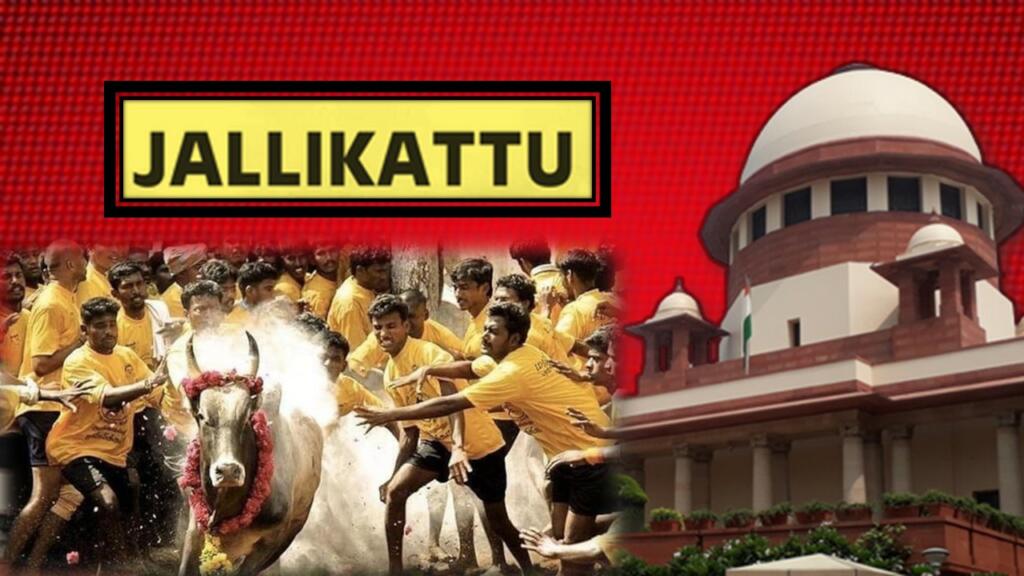The game of ‘Jallikattu’ is more than just a leisure recreation. The sport is a cultural and customary tradition of Tamil Nadu aimed at preserving the vitality and agile strength of the indigenous livestock. Contrarily, some antagonists claim that the tradition is against the ethos and rights of animals. The view had been endorsed by the Supreme Court in the judgment of Animal Welfare Board of India vs. A. Nagaraja, whereby the court held that the tradition was in violation to rights of animals and amounted to cruelty.
Subsequently, the ban on the popular bull-taming sport was overturned by the Prevention of Cruelty to Animals (Tamil Nadu Amendment) Act of 2017 and the Prevention of Cruelty to Animals (Conduct of Jallikattu) Rules of 2017. The said amendments once again opened the gates for the continuation of the practice keeping in view the cultural and customary rights of the people.
Untested Dispute pertaining to Cultural rights of Tamils
The protagonists claim that the tradition of Jallikattu finds mention in Sangam manuscripts and is known to have been in practice throughout the Tamil classical period from 400 to 100 BCE. Therefore, the state government of Tamil Nadu had to come up with the amendments in 2017 to nullify the ban imposed on Jallikattu by the 2014 verdict of the Supreme Court. As a consequence, further petitions were filed before the Apex Court challenging the validity of the impugned amendments.
Following which a 5-Judge Constitutional Bench was constituted by the Supreme Court to examine whether the 2017 Tamil Nadu state amendment on Jallikattu can be protected under Article 29 as cultural right or whether the tradition amounted to direct contravention of A. Nagaraja judgment. However, the Constitutional Bench of the Supreme Court temporarily stalled the debate by reserving the judgment on the legality of the tradition of Jallikattu.
Also read: Mobarik Ali Ahmed vs State of Bombay, 1957: Foreign nationals under the grip of IPC
Arguments advanced in favor of Jallikattu
The Tamil Nadu government had been adamant with its stance in favor of Jallikattu as the tradition has been cherished since ages by the people of Tamil Nadu. During the arguments at the Apex Court, Senior advocate Mukul Rohatgi, appearing for Tamil Nadu, pointed out the threat to life of human beings and that of participating animals is part and parcel of every game.
The learned advocate asserted that in every field of activity, the threat to life persists, be it driving on the road or somebody doing something else. Therefore, mere apprehension of threat to the cultural rights of people cannot be curtailed.
Furthermore, on the issue that the Jallikattu sport is in contravention to the ban imposed by the Supreme court in the 2014 judgment, the senior counsel contended that that the Nagaraja dictum does not lay down the correct law as the verdict proceeds on the biased premise that animals have rights, without taking into consideration the rights of people indulging in the sport.
Additionally, on the issue that ownership and participation of an animal for Jallikattu amounts to cruelty, Senior advocate Rakesh Dwivedi, appearing for the Tamil Nadu government, asked the court how killing an animal for food was not considered cruelty in the law.
Also read: Tukaram vs State of Maharashtra: The case whose aftermath introduced misandry in IPC
He opined that it is not that we will not survive without mutton or fish, because Vegans do. Through the inquisitive enquiry he then went on to indicate that by killing for food, section 11(3)(e) of the PCA Act acknowledged that there are certain prevalent cultures where meat is a traditional part of the diet.
Various factors like climate, environment and habits have defined such cultures. Therefore, he said, a law cannot be brought in “suddenly to stop a long-prevailing habit”. Therefore, extending the logic, the senior counsel advocated that Jallikattu is an ancient game of Tamil Nadu with inherent rules, and all necessary regulations are in place to ensure that no unnecessary pain is inflicted on animals.
Further advocating the claims of the Tamil rights, Senior advocate Kapil Sibal, on behalf of the Government of Tamil Nadu, asserted that not every responsibility results in a concomitant right as a matter of law. The mere notion of holding Jallikattu a blood sport is based on a flawed premise that presumes that animals have a right to demand their well-being and the responsibility for the same is casted on humans. He heighted that no such right exists under the legal landscape of the nation, and a mere moral obligation lies on the humans to not cause unnecessary pain or suffering on animals.
Therefore, he argued that the interpretation in A. Nagaraja case was misconceived as Jallikattu under the amended laws has evolved, and with the present regulation in place, the precautions against cruelty to animals can be curtailed and consequently, the cultural rights of citizens cannot be abridged.
That is to say, the customary practice of Jallikattu is an intrinsic cultural right of the people of Tamil Nadu and the courts should abstain from playing with the sentiments of the people as animal rights are being curtailed throughout the globe on many counts. But specifically targeting Tamil culture is more of ‘eco-extortion’ guised under ‘judicial activism’ by vested interest groups.
Support TFI:
Support us to strengthen the ‘Right’ ideology of cultural nationalism by purchasing the best quality garments from TFI-STORE.COM
Also Watch:
https://www.youtube.com/watch?v=5yBFu_06_lM
